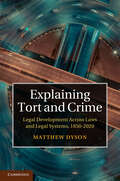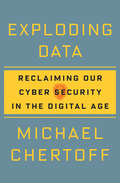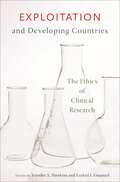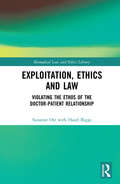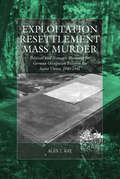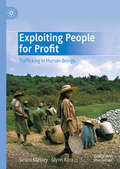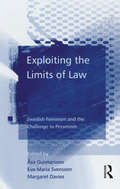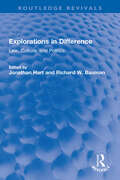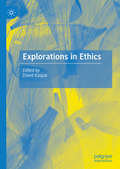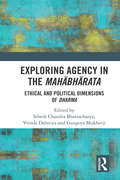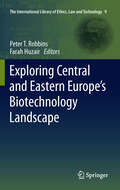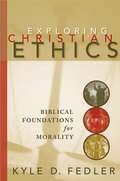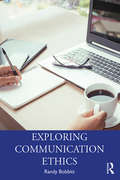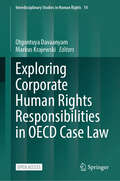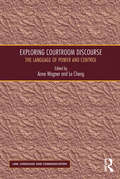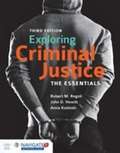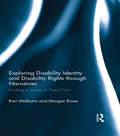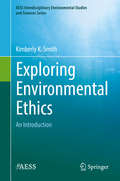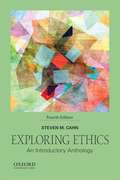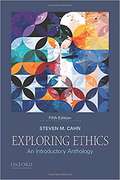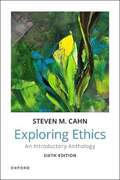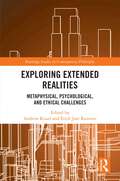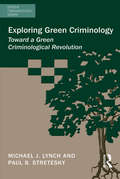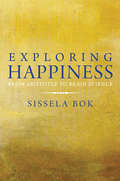- Table View
- List View
Explaining Tort and Crime: Legal Development Across Laws and Legal Systems, 1850–2020
by Matthew DysonTracing almost 200 years of history, Explaining Tort and Crime explains the development of tort law and criminal law in England compared with other legal systems. Referencing legal systems from around the globe, it uses innovative comparative and historical methods to identify patterns of legal development, to investigate the English law of fault doctrine across tort and crime, and to chart and explain three procedural interfaces: criminal powers to compensate, timing rules to control parallel actions, and convictions as evidence in later civil cases. Matthew Dyson draws on decades of research to offer an analysis of the field, examining patterns of legal development, visible as motifs in the law of many legal systems.
Exploding Data: Reclaiming Our Cyber Security in the Digital Age
by Michael ChertoffA former Secretary of Homeland Security examines our outdated laws regarding the protection of personal information, and the pressing need for change. Nothing undermines our freedom more than losing control of information about ourselves. And yet, as daily events underscore, we are ever more vulnerable to cyber-attack. In this bracing book, Michael Chertoff makes clear that our laws and policies surrounding the protection of personal information, written for an earlier time, are long overdue for a complete overhaul. On the one hand, the collection of data—more widespread by business than by government, and impossible to stop—should be facilitated as an ultimate protection for society. On the other, standards under which information can be inspected, analyzed, or used must be significantly tightened. In offering his compelling call for action, Chertoff argues that what is at stake is not so much the simple loss of privacy, which is almost impossible to protect, but of individual autonomy—the ability to make personal choices free of manipulation or coercion. Offering vivid stories over many decades that illuminate the three periods of data gathering we have experienced, Chertoff explains the complex legalities surrounding issues of data collection and dissemination today, and charts a path that balances the needs of government, business, and individuals alike. &“Surveys the brave new world of data collection and analysis…The world of data as illuminated here would have scared George Orwell.&”―Kirkus Reviews &“Chertoff has a unique perspective on data security and its implications for citizen rights as he looks at the history of and changes in privacy laws since the founding of the U.S.&”—Booklist
Exploitation and Developing Countries: The Ethics of Clinical Research
by Jennifer S. Hawkins and Ezekiel J. EmanuelWhen is clinical research in developing countries exploitation? Exploitation is a concept in ordinary moral thought that has not often been analyzed outside the Marxist tradition. Yet it is commonly used to describe interactions that seem morally suspect in some way. A case in point is clinical research sponsored by developed countries and carried out in developing countries, with participants who are poor and sick, and lack education. Such individuals seem vulnerable to abuse. But does this, by itself, make such research exploitative? Exploitation and Developing Countries is an attempt by philosophers and bioethicists to reflect on the meaning of exploitation, to ask whether and when clinical research in developing countries counts as exploitative, and to consider what can be done to minimize the possibility of exploitation in such circumstances. These reflections should interest clinical researchers, since locating the line between appropriate and inappropriate use of subjects--the line between exploitation and fair use--is the central question at the heart of research ethics. Reflection on this rich and important moral concept should also interest normative moral philosophers of a non-Marxist bent. In addition to the editors, the contributors are Richard J. Arneson, Alisa L. Carse, Margaret Olivia Little, Thomas Pogge, Andrew W. Siegel, and Alan Wertheimer.
Exploitation, Ethics and Law: Violating the Ethos of the Doctor-Patient Relationship (Biomedical Law and Ethics Library)
by Suzanne Ost Hazel BiggsFocusing on a matter of continuing contemporary significance, this book is the first work to offer an in-depth exploration of exploitation in the doctor-patient relationship. It provides a theoretical analysis of the concept of exploitation, setting out exploitation’s essential elements within the authors’ account of wrongful exploitation. It then presents a contextual analysis of exploitation in the doctor-patient relationship, considering the dynamics of this fiduciary relationship, the significance of vulnerability, and the reasons why exploitation in this relationship is particularly wrongful. Two case studies – sexual exploitation and assisted dying – are employed to assess what the appropriate legal, ethical and regulatory responses to exploitation should be, to identify common themes regarding the doctor’s behaviour (such as the use of undue influence as a conduit through which to take advantage of and misuse patients), and to illustrate the effects of exploitation on patients. A recurring question addressed is how exploitation in the doctor-patient relationship is and should be dealt with by ethics, regulators and the law, and whether exploitation in this relationship is a special case. The book provides a critical, interdisciplinary evaluation of exploitation in the doctor-patient relationship that will be of interest to health care lawyers, bioethicists, legal academics and practitioners, health care professionals and policymakers.
Exploitation, Resettlement, Mass Murder
by Alex J. KayConvinced before the onset of Operation "Barbarossa" in June 1941 of both the ease, with which the Red Army would be defeated and the likelihood that the Soviet Union would collapse, the Nazi regime envisaged a radical and far-reaching occupation policy which would result in the political, economic and racial reorganization of the occupied Soviet territories and bring about the deaths of 'x million people' through a conscious policy of starvation. This study traces the step-by-step development of high-level planning for the occupation policy in the Soviet territories over a twelve-month period and establishes the extent to which the various political and economic plans were compatible.
Exploiting People for Profit: Trafficking in Human Beings
by Simon Massey Glynn RankinThis book provides a short, comprehensive, critical analysis of trafficking in human beings. Despite the size and scope of this criminal activity, there remains a need for an accurate, objective, contemporary examination of this threat as the nature of this crime and the strategies developed to counter it are fluid. Trafficking harms not only the lives of those trafficked but equally families and communities, as well as national economies and social cohesion. As this crime spans the spectrum of social science disciplines and fields of study, together with its increasing exposure in the media, this has led to a sharp increase in interest in this topic within the academic community and amongst policy makers, criminal justice practitioners and the wider public. This book draws on current research, the authors’ expert knowledge and insight into current counter-trafficking practices to provide a critical analysis of the crime and strategies to counter its prevalence.
Exploiting the Limits of Law: Swedish Feminism and the Challenge to Pessimism
by Eva-Maria Svensson Åsa GunnarssonMoving beyond the question of whether an area of scholarly investigation can truly be characterized as 'legal', Exploiting the Limits of Law combats the often unhelpful constraints of law's subject-matter and formal processes. Through a process of reflection on the limits of law and repeated efforts to redraw them, this book challenges the general sense of pessimism among feminists and others about the usefulness of law as an instrument of change. The work combines theoretical analysis of the law's boundaries with investigation of the practical settings for changing legal and policy environments. Both the empirical focus of this volume, and its underlying theoretical concern with the limits of the law and its gender implications, render it of interest to legal scholars throughout the world, whether of EU law, feminism, social policy or philosophy.
Explorations in Difference: Law, Culture, and Politics (Routledge Revivals)
by Jonathan Hart Richard W. BaumanFirst published in 1996, Explorations in Difference explores how contemporary debates over identity and difference come into play within the workings of cultural, legal, and political institutions. The book brings together a variety of perspectives on the meanings and implications of difference in the context of postmodern theory. It is divided into two parts: ‘Theoretical Accounts’, which establishes a context for postmodern inquiries into difference, and ‘Instances’, which provides application to particular issues. Highly interdisciplinary, Explorations in Difference continues to have lasting relevance and will appeal to those with an interest in postmodern difference and its implications.
Explorations in Ethics: Meta, Normative, And Applied
by David KasparExplorations in Ethics is a collection of essays with a speculative bent. Its twelve contributors attempt to take ethics thinking in new directions. Ethics is fundamentally a speculative discipline. We sometimes lose sight of that because of our current scholarly practices, which include reliance on a set of traditional works in ethics, deferring to the scholarly literature, drawing from the evidential sources afforded us. This volume breaks the mold. It is committed, first and foremost, to exploring new ground in a methodologically sound way whilst respecting and building on the literature where needed. The contributors range from world renowned ethicists to early-career scholars. The ethical standpoints represented are various and the overall aim of this collection is to stimulate fresh thinking.
Exploring Agency in the Mahabharata: Ethical and Political Dimensions of Dharma
by Sibesh Chandra Bhattacharya Vrinda Dalmiya Gangeya MukherjiThe Mahabharata, one of the major epics of India, is a sourcebook complete by itself as well as an open text constantly under construction. This volume looks at transactions between its modern discourses and ancient vocabulary. Located amid conversations between these two conceptual worlds, the volume grapples with the epic’s problematisation of dharma or righteousness, and consequently, of the ideal person and the good life through a cluster of issues surrounding the concept of agency and action. Drawing on several interdisciplinary approaches, the essays reflect on a range of issues in the Mahabharata, including those of duty, motivation, freedom, selfhood, choice, autonomy, and justice, both in the context of philosophical debates and their ethical and political ramifications for contemporary times. This book will be of interest to scholars and researchers engaged with philosophy, literature, religion, history, politics, culture, gender, South Asian studies, and Indology. It will also appeal to the general reader interested in South Asian epics and the Mahabharata.
Exploring Betty A. Reardon’s Perspective on Peace Education: Looking Back, Looking Forward (Pioneers in Arts, Humanities, Science, Engineering, Practice #20)
by Dale T. SnauwaertThis book presents commentaries by a leading international group of peace education scholars and practitioners concerning Reardon’s peace education theory and intellectual legacy. The guiding question throughout the book is: How can her foundational work be used to advance the theory and practice of peace education? In an attempt to find answers, the contributing authors explore three general areas of inquiry: (1) Theoretical Foundations of Peace and Human Rights Education; (2) Feminism and the Gender Perspective as Pathways of Transformation Toward Peace and Justice; and (3) Peace Education Pedagogy and Practices. A contemplative commentary by Reardon herself rounds out the coverage
Exploring Central and Eastern Europe’s Biotechnology Landscape
by Peter T. Robbins Farah HuzairAt a time when the human genome has been sequenced advances in the life sciences seem to have great potential for human health, industry and the environment throughout Central and Eastern Europe (CEE). Still, for some, potential risks and ethical dilemmas remain, surrounding issues such as the appropriate use of GM crops, stem cells, genetic information, the nature of intellectual property and other challenges that come with EU accession. This book is the first of its kind to bring together experts from across Europe to explore the landscape of current life science policy and industrial development in CEE, including implications for economies, regulatory and legal frameworks, health care, ethics and human rights. It will be essential reading for researchers and students in science and technology studies, development, sociology, politics and law, and those interested in life science development in transition economies.
Exploring Christian Ethics: Biblical Foundations for Morality
by Kyle D. FedlerAdopting a unique appraoch among inroductions to Christian ethics, Kyle Fedler's Exploring Christian Ethics guides students through the moral decision-making process by providing foundational material in both ethical theory and biblical ethics. First, Fedler introduces the reader to the discipline of ethics, then he explores the ways Scripture can be used responsibly in Christian ethics, and finally, he presents and analyzes the sections of Scripture that have been most influential in Christian morality and ethics.
Exploring Communication Ethics: A Socratic Approach
by Randy BobbittExploring Communication Ethics is a comprehensive textbook on the ethical issues facing communication professionals in today&’s rapidly changing media environment. Empowering students to respond to real-world ethical dilemmas by drawing upon philosophical principles, historical background, and the ethical guidelines of major professional organizations, this book is designed to stimulate class discussion through real-world examples, case studies, and discussion problems. Students will learn how to mediate between the best interests of their employers and their responsibilities toward other parties, and to consider how economic, technological, and legal changes in their industries affect these ethical considerations. It can be used as a core textbook for undergraduate or graduate courses in communication or media ethics, and provides an ideal supplement for specialist classes in public relations, professional communication, advertising, political communication, or journalism and broadcast media.
Exploring Corporate Human Rights Responsibilities in OECD Case Law (Interdisciplinary Studies in Human Rights #14)
by Markus Krajewski Otgontuya DavaanyamThis open access book consolidates a collection of scholarly papers presented at the academic conference titled "Corporate Human Rights Responsibility in OECD Case Law: Actors, Issues, Responsibilities, and Remedies", held on 4 and 5 May 2023. The conference was organized by the OECD Case Law Project at Friedrich-Alexander-Universität Erlangen-Nürnberg. The book is divided into three sections. The first examines how NCP cases interpret corporate responsibilities, including financial institutions, on human rights and environmental issues, focusing on climate change and conflict-affected zones. It also highlights how OECD cases address corporate accountability and its impact on the revised OECD Guidelines and the EU Corporate Sustainability Due Diligence Directive (CSDDD). The second section critically evaluates the NCP mechanism's effectiveness, assessing whether it provides substantive remedies and how well NCP mediation resolves disputes. It offers both quantitative and qualitative analysis of the grievance processes in line with UNGP effectiveness criteria. The third section explores the NCP’s role in global corporate responsibility frameworks, particularly its potential influence on shaping mandatory due diligence obligations through frameworks like the CSDDD, reinforcing corporate accountability in international business practices. Additionally, the book offers key recommendations for policymakers, NCP experts, and practitioners on improving the NCP system to ensure more meaningful outcomes for human rights violations.
Exploring Courtroom Discourse: The Language of Power and Control (Law, Language and Communication)
by Le ChengThis volume presents a combination of practical, empirical research data and theoretical reflection to provide a comparative view of language and discourse in the courtroom. The work explores how the various disciplines of law and linguistics can help us understand the nature of "Power and Control" - both oral and written - and how it might be clarified to unravel linguistic representation of legal reality. It presents and examines the most recent research and theories at national and international levels. The book represents a valuable contribution to the study and analysis of courtroom discourse and courtroom cultures more generally. It will be of interest to students and researchers working in the areas of language and law, legal theory, interpretation, and semiotics of law.
Exploring Criminal Justice: The Essentials
by Robert M. Regoli John D. Hewitt Anna E. KosloskiNow in a modernized Third Edition, the best-selling Exploring Criminal Justice: The Essentials continues to engage students in an exploration of the American criminal justice system. This classic text covers the foundational concepts of criminal law and the justice system, including the people and processes that make up the system and how they interact. It features updated statistics and data, contemporary court cases and case studies, and updated references for all topics. With Exploring Criminal Justice: The Essentials students will understand the relationship between law enforcement, corrections, law, policy making and administration, the juvenile justice system, and the courts. This well-organized and comprehensive text is the clear choice for introductory criminal justice courses.
Exploring Disability Identity and Disability Rights through Narratives: Finding a Voice of Their Own
by Ravi Malhotra Morgan RoweBuilding on David M. Engel and Frank W. Munger’s work analyzing the narratives of people with physical and learning disabilities, this book examines the life stories of twelve physically disabled Canadian adults through the prism of the social model of disablement. Using a grounded theory approach and with extensive reporting of the thoughts of the participants in their own words, the book uses narratives to explore whether an advocacy identity helps or hinders dealings with systemic barriers for disabled people in education, employment, and transportation.<P><P> The book underscores how both physical and attitudinal barriers by educators, employers and service providers complicate the lives of disabled people. The book places a particular focus on the importance of political economy and the changes to the labour market for understanding the marginalization and oppression of people with disabilities. By melding socio-legal approaches with insights from feminist, critical race, and queer legal theory, Ravi Malhotra and Morgan Rowe ask if we need to reconsider the social model of disablement, and proposes avenues for inclusive legal reform.
Exploring Environmental Ethics: An Introduction (Aess Interdisciplinary Environmental Studies And Sciences Ser.)
by Kimberly K. SmithThis book is designed as a basic text for courses that are part of an interdisciplinary program in environmental studies. The intended reader is anyone who expects environmental stewardship to be an important part of his or her life, as a citizen, a policy maker, or an environmental management professional. In addition to discussing major issues in environmental ethics, it invites readers to think about how an ethicist's perspective differs from the perspectives encountered in other environmental studies courses. Additional topics covered include corporate social responsibility, ecological citizenship, property theory, and the concept of stewardship as a vocation.
Exploring Ethics: An Introductory Anthology
by Steven M. CahnThis text brings together a rich, balanced, and wide-ranging collection of over fifty readings on ethical theory and contemporary moral issues. The selections are organized into three parts, providing instructors with flexibility in designing and teaching a variety of ethics courses.
Exploring Ethics: An Introductory Anthology
by Steven M. CahnIn this remarkably accessible, concise, and engaging introduction to moral philosophy, Steven M. Cahn brings together a rich, balanced, and wide-ranging collection of fifty-two readings on ethical theory and contemporary moral issues. He has carefully edited all the articles to ensure that they will be exceptionally clear and understandable to undergraduate students. The selections are organized into three parts--Challenges to Morality, Moral Theories, and Moral Problems--providing instructors with flexibility in designing and teaching a variety of ethics courses. Each reading is followed by study questions. <p><p> The fifth edition features twelve new articles and unparalleled representation of women philosophers, with nearly half of the essays authored or coauthored by women. A password-protected Instructor's Manual is available on the book's Ancillary Resource Center. Visit the book's free, open-access Companion Website for additional student and instructor resources.
Exploring Ethics: An Introductory Anthology
by Steven M. CahnIn this remarkably accessible, concise, and engaging introduction to moral philosophy, Steven M. Cahn brings together a rich, balanced, and wide-ranging collection of fifty-two readings on ethical theory and contemporary moral issues. He has carefully edited all the articles to ensure that they will be exceptionally clear and understandable to undergraduate students. The selections are organized into three parts--Challenges to Morality, Moral Theories, and Moral Problems--providing instructors with flexibility in designing and teaching a variety of ethics courses. Each reading is followed by study questions.
Exploring Extended Realities: Metaphysical, Psychological, and Ethical Challenges (Routledge Studies in Contemporary Philosophy)
by Andrew Kissel Erick José RamirezThis volume highlights interdisciplinary research on the ethical, metaphysical, and experimental dimensions of extended reality technologies, including virtual and augmented realities. It explores themes connected to the nature of virtual objects, the value of virtual experiences and relationships, experimental ethics, moral psychology in the metaverse, and game/simulation design. Extended Reality (XR) refers to a family of technologies aiming to augment (AR) or virtually replace (VR) human experience. The chapters in this volume represent cutting-edge research on XR experiences from a wide range of approaches including philosophy, psychology, Africana studies, and the cognitive sciences. They are organized around three guiding questions. Part 1, "What is Extended Reality?", contains a series of chapters examining metaphysical questions about virtual objects, actions, and worlds. Part 2, "Is There an Ethics for Extended Realities?", includes chapters that address ethical questions that arise within XR experiences. Finally, Part 3, "What Can We Do with Extended Realities?", features chapters from a diverse group of social scientists on the potential uses of XR as an investigative and educational tool, including its strengths and pitfalls. Exploring Extended Realities will appeal to scholars and advanced students working in philosophy of technology, metaphysics, moral psychology, applied ethics, and game studies.
Exploring Green Criminology: Toward a Green Criminological Revolution (Green Criminology)
by Michael J. Lynch Paul B. StreteskyFew criminologists have drawn attention to the fact that widespread and significant forms of harm such as green or environmental crimes are neglected by criminology. Others have suggested that green crimes present the most important challenge to criminology as a discipline. This book argues that criminology needs to take green harms more seriously and to be revolutionized so that it forms part of the solution to the large environmental problems currently faced across the world. It asks how criminology should be redesigned to consider green/environmental harm as a key area of study in an era where destruction of the earth and the world’s ecosystem is a major concern and examines why this has remained unaccomplished so far. The chapters in this book apply an environmental frame of reference underlying a green approach to issues which can be addressed from within criminology and which can encourage criminologists and environmentalists to respond and react differently to environmental crime.
Exploring Happiness: From Aristotle to Brain Science
by Sissela BokFrom the acclaimed author of Lying, a brilliant exploration of happiness set in the context of the world’s great philosophers, leaders, writers, and artists In this smart and timely book, the distinguished moral philosopher Sissela Bok ponders the nature of happiness and its place in philosophical thinking and writing throughout the ages. With nuance and elegance, Bok explores notions of happiness—from Greek philosophers to Desmond Tutu, Charles Darwin, Iris Murdoch, and the Dalai Lama—as well as the latest theories advanced by psychologists, economists, geneticists, and neuroscientists. Eschewing abstract theorizing, Bok weaves in a wealth of firsthand observations about happiness from ordinary people as well as renowned figures. This may well be the most complete picture of happiness yet.This book is also a clarion call to think clearly and sensitively about happiness. Bringing together very different disciplines provides Bok with a unique opportunity to consider the role of happiness in wider questions of how we should lead our lives and treat one another—concerns that don’t often figure in today’s happiness equation. How should we pursue, weigh, value, or limit our own happiness, or that of others, now and in the future? Compelling and perceptive, Exploring Happiness shines a welcome new light on the heart of the human condition.
